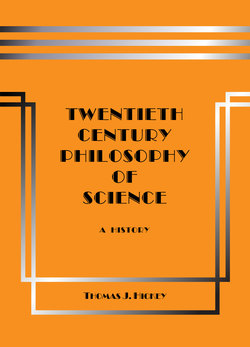Читать книгу Twentieth-Century Philosophy of Science: A History (Third Edition) - Thomas J. Hickey - Страница 57
На сайте Литреса книга снята с продажи.
3.26 Signification and Supposition
ОглавлениеSupposition enables identifying ambiguities not due to differences in signification that make equivocations, but instead are ambiguities due to differences in relating the semantics to its ontology.
The signification of a descriptive term is its meaning, and terms with two or more alternative significations are equivocal in the sense described in Section 3.25. The signification of a univocal term has different suppositions, when it describes ontology differently due to its having different functions in the sentences containing it.
Historically the subject term in the categorical proposition is said to be in “personal” supposition, because it references individual entities, while the predicate term is said to be in “simple” supposition, because the predicate signifies attributes without referencing any individual entities manifesting the attributes. For this reason the predicate in the categorical proposition is not logically quantified with any syncategorematic terms such as “every” or “some”. For example in “Every raven is black” the subject term “raven” is in personal supposition, while the predicate “black” is in simple supposition. So too for “No raven is black”.
Unlike semantical rules that describe signification, the supposition of descriptive terms in object language depends only on the rôle of the terms in a statement containing them and not on the truth of the statement. Thus the suppositions of the subject and predicate terms respectively are the same in the statement “Every raven is orange”, which is believed to be false, as they are in the statement “Every raven is black”, which is believed to be true.
Both personal and simple suppositions are types of “real” supposition, because they are different ways of talking about extramental reality. They operate in expressions in object language and thus describe ontologies as either attributes or the referenced individuals characterized by the signified attributes. Real supposition is contrasted with “logical” supposition, in which the meaning of the term is referenced in the metalinguistic perspective exclusively as a meaning, i.e., only semantics is referenced and not extramental ontology. For example in “Blackness is a component part of the meaning of raven”, the terms “raven” and “blackness” in this statement are in logical supposition. Similarly to say in explicit metalanguage “‘Every raven is black’ is a semantical rule” to express “Black is a component part of the meaning of raven”, is again to use both “raven” and “black” in logical supposition.
Furthermore just to use “Every raven is black” as a semantical rule in order to exhibit its meaning composition without actually saying that it is a semantical rule, is also to use the sentence in the metalinguistic perspective and in logical supposition. The difference between real and logical supposition in such use of a sentence is not exhibited syntactically, but is pragmatic and depends on the intention of the writer or speaker. Whenever a universally quantified affirmation is used in the metalinguistic perspective as a semantical rule for analysis in the semantical dimension, both the subject and predicate terms are in logical supposition. Lexical entries in dictionaries are in the metalinguistic perspective and in logical supposition, because they are about language and are intended to describe meanings.
In all the above types of supposition the same univocal term has the same signification. But another type of so-called supposition proposed incorrectly in ancient times is “material supposition”, in which the term is referenced in metalanguage as a linguistic symbol in the syntactical dimension with no reference to a term’s semantics or ontology in object language. An example is “’Raven’ is a five-letter word”. In this example “raven” does not refer either to the individual real bird or to its characteristics as in real supposition or to the universal concept of it as in logical supposition. Thus material supposition is not supposition properly so called, because the signification is different. It is actually an alternative meaning and thus a type of semantical equivocation. Some philosophers have used other vocabularies for recognizing this equivocation: Stanislaw Lesńiewski’s “use” (semantics) vs “mention” (syntax) and Rudolf Carnap’s “material mode” (semantics) vs “formal mode” (syntax).
